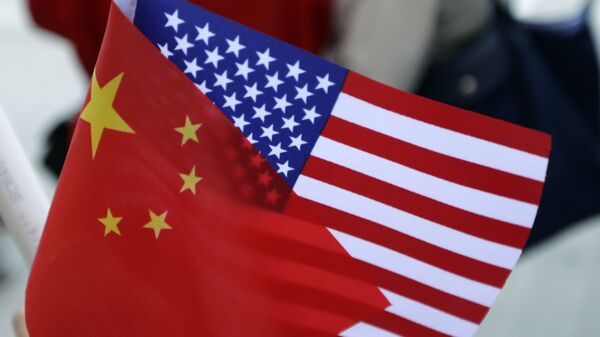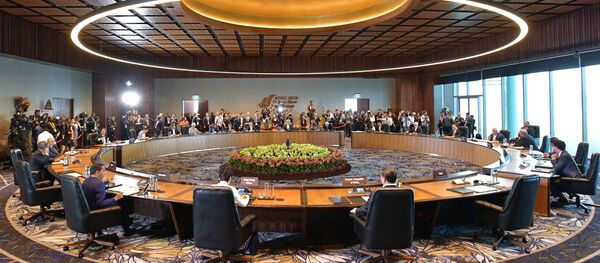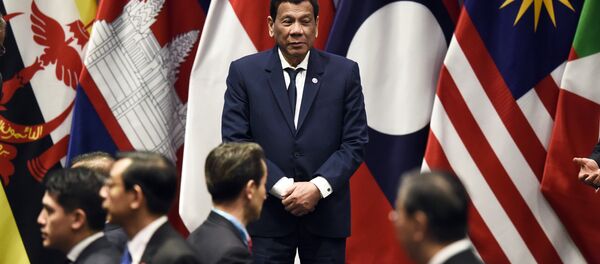Sputnik discussed Mr Pence's criticism of China's actions in the South China Sea with Bill Hayton, associate fellow at Chatham House's Asia program and author of "The South China Sea: The Struggle for Power in Asia."
And what's kind of weird about this is when China sails through other countries' territorial waters, it makes use of this innocent passage provision. For example, last year in July 2017, three Chinese warships sailed through British territorial waters and the year before that, they sailed through American territorial waters and, yet, when American warships tried to do the same thing in the South China Sea, China tries to block them; so this I guess is the thing that's most worrying Vice President Pence.
Sputnik: There's been a lot of exchanging statements of this kind with China's Foreign Ministry spokesperson saying the so-called issue of "navigation freedom" is non-existent and reminding Mr Pence that the US has not ratified the Law of the Sea Convention…
Bill Hayton: Which is very good point. The US has signed but has not ratified the UN Convention on the Law of the Sea (UNCLOS). This is something I think which the US Senate is responsible for, it is the Senate in the US that has to ratify treaties and for the time being, there are enough Senators, about a third, to block the ratification — I think that's an embarrassment to the United States and I think it's something the US does need to do; but in terms of the behaviour of the United States, the US Navy, all the parts which government controls, abide by UNCLOS.
READ MORE: China Cuts US Bond Investments by Almost $14 Bln Amid Trade Row — Report
Sputnik: That's very puzzling indeed and I'm wondering why the Senate would sit on that ratification for so long?
Bill Hayton: There are various obstacles; it's mainly from the Right in the US, they are the ones that don't like the idea of shared sovereignty, there are those that don't like some provisions which are to do with something called The International Seabed Authority, and some are more nationalistic and don't see why the US should join any international conventions. There is a range of views in the US Senate.
Sputnik: I'm guessing you don't see that changing anytime soon?
Bill Hayton: Not in the current situation, no. I thought maybe possibly under the previous president there might've been a chance, but not at the moment.
Sputnik: Going back to ASEAN, it was chosen as a venue for all this exchange; is the US attempting to send signals to ASEAN nations, perhaps?
Sputnik: Still, even if it is more like rhetoric at these high-profile events, it does serve its purpose, doesn't it?
Bill Hayton: Yes, and I think some of the Southeast Asian countries are pleased to have the US in the region saying these things, it allows the US to say things which they feel, to some extent, but they can't because of their relationship with China, and I don't think the Southeast Asians want to be the victims in a fight between the US and China, but at the same time there are some opportunities to be had with this competition between all the various powers and let's put Japan, India and other countries in the mix as well.
READ MORE: Vice President Pence: US Won't Lift Tariffs Until ‘China Changes Its Ways'
There are opportunities for clever Southeast Asian countries to sort of play one off against the other and to sort of balance between them. They don't want the US to disappear and just to be left as part of a Chinese sphere of influence, or anybody else's sphere of influence. So yes, the Southeast Asians are concerned that power competition in their part of the world could have bad effects, but at the same time they don't want just to be abandoned.
Sputnik: Generally, what could we expect from the US regarding China in the coming months? We've seen some contradictory statements: we've heard President Trump's somewhat milder remarks regarding China, then we heard Mr Pence slamming it and vowing to double tariffs on Beijing if it doesn't meet US demands; what's happening? What are the dynamics there?
I think he's particularly focused on the future of the American manufacturing industry and wants to keep that alive. In some ways, it does echo what I was saying about China's attitude towards UNCLOS: you have one country that says it's abiding by multilateralism, but when it comes to its own backyard, it's very, very difficult for other countries' companies to export into the Chinese market.
READ MORE: Trump Hopes US Won't Have to Impose More Tariffs on China
So China says it is upholding this multilateral order, but its own behaviour suggests it's not; whereas you have the US which sounds very unilateral and nationalistic but, of course, it's far easier for foreigners to go and invest in the US or to export products there.
The views and opinions expressed by Bill Hayton do not necessarily reflect those of Sputnik.







